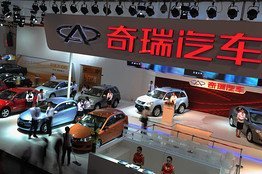China’s Newest Car Brand: Qoros

The latest addition: a new brand called Qoros launched officially Monday by investment firm Israel Corp. and China’s Chery Automobile Co.
Qoros Automotive Co., a 50-50 joint venture between the two companies, is led by Chief Executive Officer Guo Qian, a Chery official, and former Volkswagen AG executive Volker Steinwascher, who serves Qoros as vice chairman. Mr. Steinwascher said in a telephone interview over the weekend that Qoros is aiming to generate annual sales of about 150,000 vehicles a year by 2015 or 2016. It plans to manufacture those cars at a plant in Changshu, a city northwest of Shanghai, and market roughly half of those vehicles in China and export the rest to Europe.
The company, Mr. Steinwascher said, is currently developing three compact cars, one of which is a sedan and is expected to hit the market in China and Europe by the end of 2013.
The brand’s competitive edge, according to Mr. Steinwascher: cars that have been designed by “seasoned” engineers with experience in working for companies like Volkswagen and BMW AG – and sell some “10% lower” in retail prices compared with comparable Volkswagen cars marketed in China. Qoros engines are being designed by Austrian engine-technology firm AVL List GmbH. and will be produced and supplied by Chery.
Qoros cars, Mr. Steinwascher said, “combine German design quality and craftsmanship with Japanese convenience and functionality” to appeal to “young, international-minded, urban consumers” in China. Those target consumers are “looking for quality and distinctive styling, and they’d like to be connected even when they are driving,” the Qoros executive said.
As ambitious as Mr. Steinwascher and his new China auto brand may be, the field is already becoming crowded, even before Qoros’ first car hits showrooms in late 2013.
“If the market continued to grow sluggishly, posting low single-digit growth, for a few years straight, a shakeout would become inevitable,” said Yale Zhang, head of consulting firm Automotive Foresight Co. in Shanghai. Mr. Zhang noted that China has about 70 brands of locally produced cars, run by home-ONEWORDgrown Chinese companies and global auto makers. Most notably, Japan’s Daihatsu Motor Co. exited the Chinese market a few years ago when it failed to generate sales to a profitable level, he said.
Yet, more foreign brands are entering China. Just last week, at the Guangzhou auto show, Volkswagen and Fiat SpA of Italy announced plans to launch the Seat and Alfa Romeo brands next year in China, respectively.
By 2013, China’s auto marketplace also will see an addition of a host of affordably priced China-only brands launched by foreign joint ventures. In August, GM and its Chinese partners launched the first product for their Baojun brand — a compact sedan called the Baojun 630. The car is priced – between 62,800 yuan (about $9,800) and 73,800 yuan – to appeal to people who are becoming just rich enough to buy cars.
Nissan Motor Co. and its Chinese partner are expected to launch their own no-frills China brand, Venucia, in the first half of 2012 when they start marketing the brand’s first product, also a small car.
Venucia is starting with 100 retail outlets, operated mostly by current Nissan dealers and plans to add a second vehicle to the lineup by the end of next year.
By 2015, Kimiyasu Nakamura, chief executive of Nissan’s main joint venture with Dongfeng Motor Group Co. COMMA said Nissan hopes to generate sales volume of about 300,000 vehicles a year – the sales scale that would rival that of carmakers like BYD Co., Chery and Zhejiang Geely Holding Group Co.
Related News


